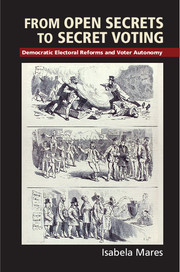Book contents
- Frontmatter
- Contents
- Figures
- Tables
- Acknowledgments
- 1 Introduction
- 2 The Protection of Voters' Autonomy
- 3 Electoral Intimidation by State Employees
- 4 Electoral Intimidation by Employers
- 5 The Production of Irregularities during Elections: A Quantitative Analysis
- 6 The Adoption of Electoral Reforms
- 7 Labor Scarcity, Rural Inequality, and Electoral Reforms: The Determinants of Electoral Reform in the Prussian Electoral System
- 8 Voting for Opposition Candidates: Economic Concentration, Skills, and Political Support for Social Democracy
- 9 Dilemmas on the Right and the Road to Proportional Representation
- 10 From Macro- to Micro-Historical Analysis in Comparative Research
- References
- Index
- Other Books in the Series
5 - The Production of Irregularities during Elections: A Quantitative Analysis
Published online by Cambridge University Press: 05 July 2015
- Frontmatter
- Contents
- Figures
- Tables
- Acknowledgments
- 1 Introduction
- 2 The Protection of Voters' Autonomy
- 3 Electoral Intimidation by State Employees
- 4 Electoral Intimidation by Employers
- 5 The Production of Irregularities during Elections: A Quantitative Analysis
- 6 The Adoption of Electoral Reforms
- 7 Labor Scarcity, Rural Inequality, and Electoral Reforms: The Determinants of Electoral Reform in the Prussian Electoral System
- 8 Voting for Opposition Candidates: Economic Concentration, Skills, and Political Support for Social Democracy
- 9 Dilemmas on the Right and the Road to Proportional Representation
- 10 From Macro- to Micro-Historical Analysis in Comparative Research
- References
- Index
- Other Books in the Series
Summary
In Chapters 1–4, I presented an account of the main forms of electoral irregularities that were present in German elections. The most important actors engaged in the perpetration of electoral intimidation were state employees and private actors. I presented a range of hypotheses about the political factors affecting the candidates' demand for electoral support from employees of the state and private actors. The decisions of state employees and private actors to supply electoral services to candidates were not entirely costless and were constrained by the range of political and economic conditions in a district. In Chapter 2, I developed a number of hypotheses about the most significant constraints on the electoral involvement of state employees and private actors. The actions used by those agents during elections violated a number of provisions of the German electoral law, which provided opportunities for candidates who lost their races to contest the outcome. Many contemporary observers of German electoral practices noted the intense legalism in the contestation of elections.
In this chapter, I subject the hypotheses about the economic and political determinants of electoral irregularities to a quantitative test. The dependent variable for the analysis includes all of the reports of electoral irregularities submitted by the parliamentary commission of the Reichstag (Wahlprüfungs-kommission), whose goal it was to establish the validity of the electoral outcomes. This complete dataset of electoral irregularities in German national elections during the period between 1870 and 1912 can be found in two separate historical sources. A study by Klein includes a collection of this data based on historical records assembled by the electoral commission of the German parliament (Klein 2003: 501–511). More recently, Robert Arsenschek and Dan Ziblatt created a new dataset of electoral irregularities in Imperial Germany that differs only in minor ways from the original data published by Klein (Arsenschek and Ziblatt 2008).
- Type
- Chapter
- Information
- From Open Secrets to Secret VotingDemocratic Electoral Reforms and Voter Autonomy, pp. 93 - 128Publisher: Cambridge University PressPrint publication year: 2015



